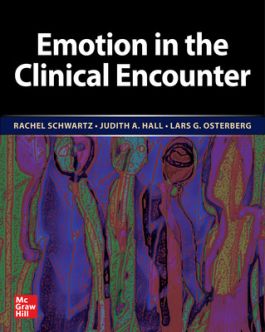Emotion in the Clinical Encounter
Foreword: Abraham Verghese
I. Emotion’s Functions
1. Emotions in 21st Century Humanistic Medicine
Rachel Schwartz, Judith A. Hall, Lars G. Osterberg
2. The Functions of Emotion: Evolutionary and Social Perspectives
Michelle N. Shiota, Erika B. Pages, Paula H. Bednarek
3. Emotion and Illness
Anne-Josée Guimond, Laura D. Kubzansky, Lewina O. Lee
4. Emotion Dialogue in the Medical Encounter: When and How Often Does It Happen
Mollie A. Ruben, Morgan D. Stosic, Debra L. Roter
II. Clinical Emotional Intelligence
5. Perception of Emotion in the Medical Visit
Morgan D. Stosic, Mollie A. Ruben, Danielle Blanch-Hartigan
6. Emotion Cues as Clinical Opportunities
Lidia del Piccolo, Arnstein Finset
7. Emotion Regulation in Patients, Providers, and the Clinical Relationship
Brett Marroquín, Vera Vine
8. Managing Emotion in Medical Encounters with Children
Benjamin A. Krauss, Piet L. Leroy, Baruch S. Krauss
9. Interacting Effectively with Individuals with Reduced Facial Expressivity
Amanda R. Hemmesch, Sarah D. Gunnery, Linda Tickle-Degnen
10. A Trauma-informed Approach to Emotion Communication in the Clinical Encounter
Ben Kaplan, Greeshma Somashekar, Missy Brown, Bria Adimora Godley, Asif Khan, Enioluwafe Ojo, Amy Weil
11. Emotion and Gender
Valerie Carrard, Anely Bekbergenova, Marianne Schmid Mast
12. Culture and Emotions in the Medical Encounter
Karolien Aelbrecht, Mary Catherine Beach
13. Emotion and Decision Making in the Clinical Encounter
Amber E. Barnato
III. Emotions in the Culture of Medicine
14. Teaching about Emotions in Healthcare
Caitlin Holt Siropaides, Martha Howell, Calvin Chou
15. Changing Medical Education to Support Emotional Wellness
Stuart Slavin
16. Striving and Thriving: Challenges and Opportunities for Clinician Emotional Wellness
Julie W. Childers, Robert M. Arnold, Elise C. Carey
Emotions are ever-present in the context of illness and medical care and can have an enormous impact on the well-being of patients and healthcare providers alike. Despite this impact, emotions are often devalued in a medical culture that praises stoicism and analytical reasoning. Featuring the latest theories and research on emotion in healthcare, this much-needed resource will help you build the necessary skillset to navigate the extraordinary emotional demands of practicing medicine.
Emotion in the Clinical Encounter will help you:
- Learn the science of emotion, as it relates to clinical care
- Understand the role of emotion in illness
- Recognize the connection between clinical response to patient emotions and
care outcomes - Develop effective strategies for emotion recognition
- Build strong emotional dialogue skills for medical encounters
- Identify biases that may shape clinical interactions and subsequent outcomes
- Understand emotion regulation in patients, providers, and in the clinical relationship
- Address challenges and opportunities for clinical emotional wellness
- Identify a new path forward for delivering emotion-based medical school curricula
—Danielle Ofri MD, PhD, Clinical Professor of Medicine, New York University, Editor-in-Chief of Bellevue Literary Review, and author of What Doctors Feel: How Emotions Affect the Practice of Medicine
“This is a unique contribution that deeply explores the role of emotions in clinical medicine, drawing on a wide range of disciplines and presenting both scholarly paradigms and practical applications. It should be essential reading for medical educators, clinicians and patient advocates who all aim to better navigate today’s frustrating healthcare system.”
—Jerome Groopman MD, Recanati Professor Harvard Medical School, and author of How Doctors Think
“Emotion in the Clinical Encounter is a must-read book for clinicians. It would be especially helpful if medical students start their careers by reading this invaluable volume to gain a deeper understanding of human emotion. The book is evidence-based and detailed enough to be perhaps the definitive guide to emotions for the clinician.”
—William Branch, MD, MACP, FACH, The Carter Smith, Sr Professor of Medicine, Emory University

